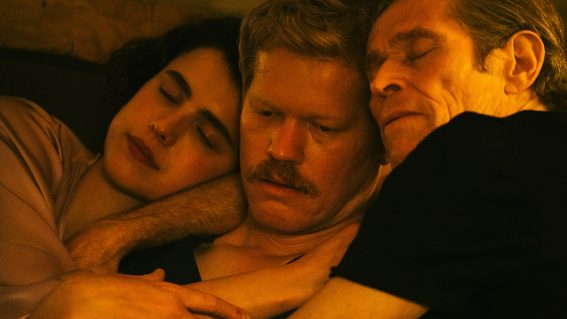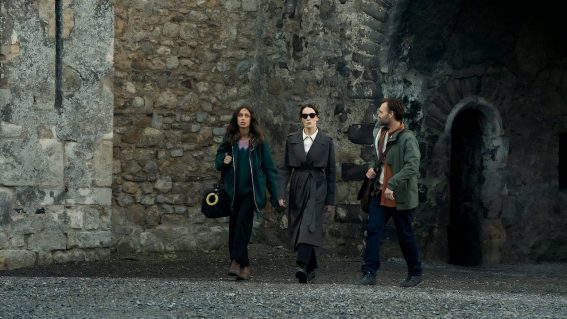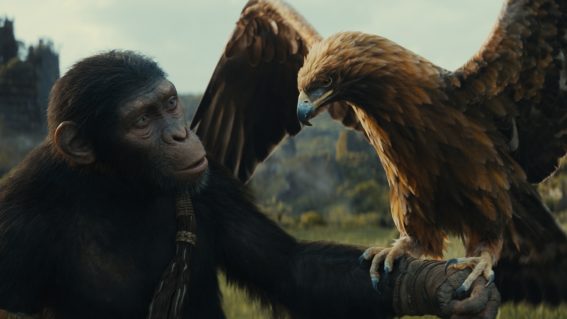Kingdom of the Planet of the Apes is a grand, triumphant, palate-cleansing blockbuster

Long-running sci-fi saga The Planet of the Apes stays cyclical and grand with newest entry Kingdom, directed by Wes Ball. Luke Buckmaster was most interested in how the film continues the “ideological pliability” we’ve seen throughout the franchise.
Kingdom of the Planet of the Apes
There’s a curiously cyclical nature to the Planet of the Apes movies, mixing real world elements with Hollywood sensationalism: the creatures we descended from are the same ones who succeed us. With Andy Serkis’ great simian Caesar having passed away at the end of the previous movie, Kingdom of the Planet of the Apes takes a giant step forward in time—to a world where apes can now speak, if a mite stop-startedly, and most humans are silent, devolved to a primitive form. Director Wes Ball has described this world as the “Bronze Age”, contrasting the previous films’ “Stone Age.”
Which is pretty epic franchise future-proofing: the Bronze Age can be padded out into god knows how many instalments before the introduction of the Iron Age, which of course enables the Space Age, by which point the apes will have presumably evolved into fully formed humans, indistinguishable from the nincompoops they conquered. Then they’ll shoot themselves into space at light speed, crash-land onto an unknown planet, discover the Statue of Liberty half-buried in the sand…like I said, cyclical.
Kingdom begins in palate-cleansing soft reboot mode, opening the window and letting some air in, before slowly and menacingly escalating into a rousing adventure that’s a sort-of war movie, comparable quality-wise to its excellent recent predecessors (2011’s Rise of the Planet of the Apes, 2014’s Dawn of the Planet of the Apes, and 2017’s War for the Planet of the Apes).
In the first act Ball introduces a tranquil village setting, with high cliffs and greenery-covered edifices, which is home to the level-headed albeit sheltered young ape Noa (Owen Teague—mo-capped, like much of the cast) and his fellow villagers. The protagonist’s life is upturned when a group of invading apes enslave its citizens, whisking them off to work and/or die, in a clashing-empires thread that reminded me of the Mayans capturing the Mesoamerican tribespeople in Apocalypto.
Determined to locate his family and friends, Noah’s path forward channels Joseph Campbell’s “hero’s journey,” its 12 point program almost exactly followed, including the meeting of a mentor (a gentle orangutan who inspires him to act compassionately) and entering an unsettling new world. The tyrannical leader of the new ape kingdom is Proximus Caesar (Kevin Durand), who’s determined to access a vault he believes contains the secrets of evolution. Connected to this plotline is a young woman named Mae (Freya Allan), who appears to be much smarter than her fellow dumb-dumb homosapiens, suggesting humankind isn’t quite done and dusted.

Most interesting, and again distinctly Campbellian, are the ways screenwriter Josh Friedman references Caesar, who has now become an almost religious figure—his “apes not kill apes” dictum sounding more than ever like a biblical commandment. In that initial invasion one of the oppressors hollers “for Caesar!”, which tell us his legend has been distorted; later Proximus cries “I am Caesar!”—the unmistakable twang of a false prophet (Proximus, by the way, has a magnetic presence. All the cast are impressive but Durand absolutely nails it, though as usual it’s impossible to gauge where the “real” performance ends and the virtual one begins).
It wouldn’t take much effort to extrapolate from this a commentary on Jesus Christ, or other revolutionaries, though that’s a connection left to the audience. Ball deduces that, when playing in the sandpit of legends and empires, Apes movies can’t help but have loaded meaning; there’s no need to put it in highlighter pen. The ideological pliability of this franchise has been well demonstrated over the years, beginning with racial allegories and branching out spectacularly—in terms of bat shit crazy moments, the worshipping of a nuclear bomb by psychic mutant humans in 1970’s Beneath the Planet of the Apes must surely rank up there.

Across these movies the tendency is to make the apes more human-like and the humans more ape-like. In that transition a huge spectrum of strange-goings can be justified, as each species navigates inflection points on the scale upwards and downwards of their civilisations, empires rising and falling, the people, apes, mutants scrambling for meaning amongst chaos, or simply trying to stay alive.
Like its aforementioned predecessors, Kingdom counters an inherently zany premise with a mood that’s heavy and operatic. It works spectacularly well, even if the cultural moment around these movies has changed, and the sheer number of them has diminished their wow factor. Nevertheless this is a rousing, grandly staged blockbuster.













